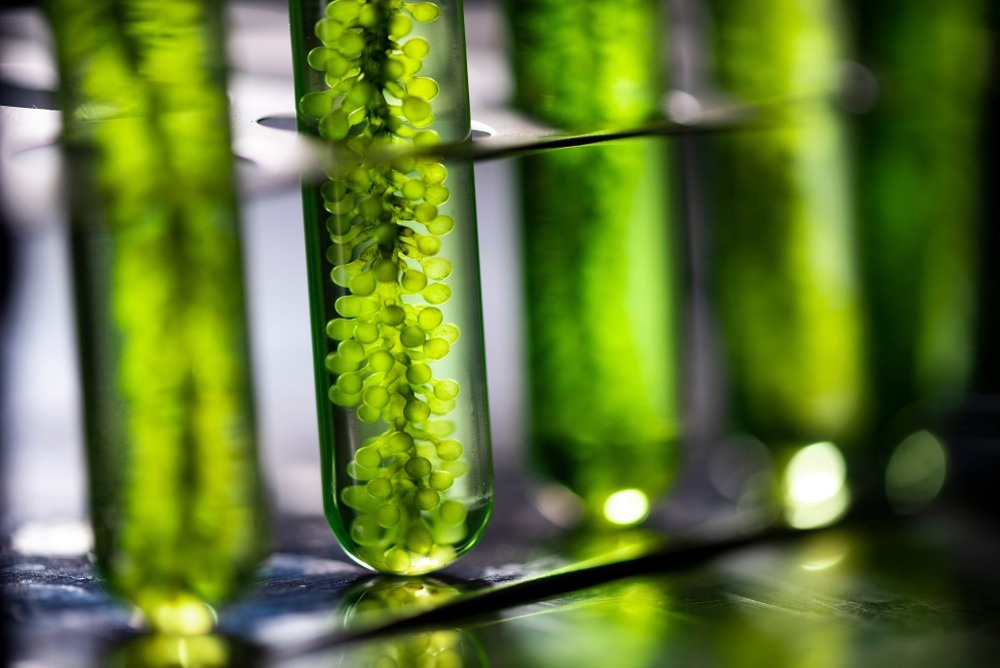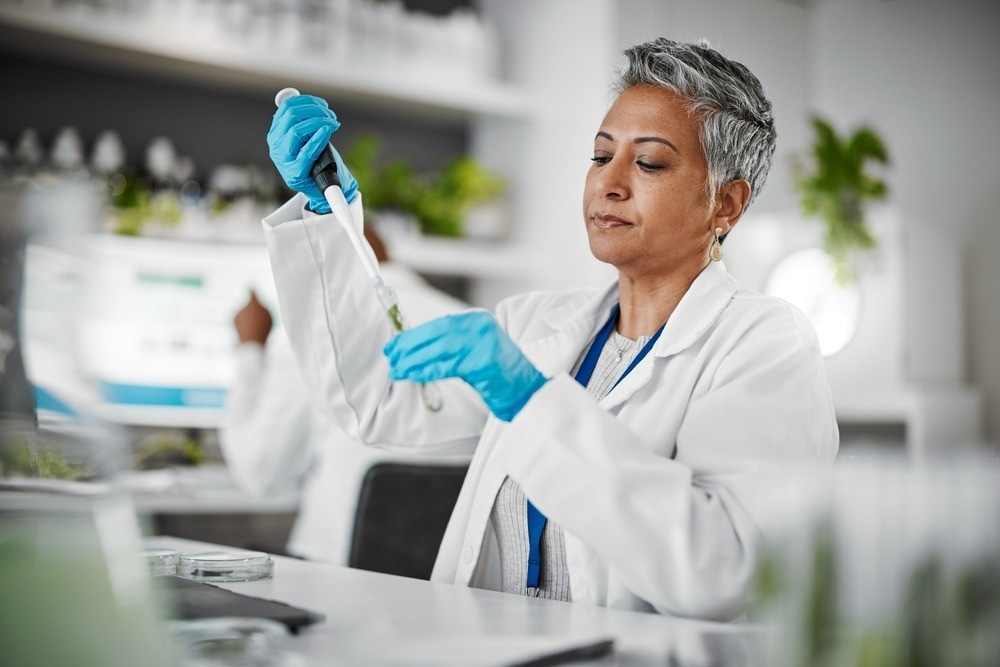There is a need to increase agricultural production to feed the rapidly growing global population. Although conventional agriculture that uses synthetic fertilizers and pesticides helps enhance crop production, it adversely affects the environment. A greater understanding of plant biology, i.e., the genetic functions, anatomy, bioactive pathways, and physiology, and their effective applications enable sustainable crop yield improvement.1

Image Credit: Chokniti-Studio/Shutterstock.com
Plants are equipped with mechanisms that enable them to respond to environmental changes like biotic and abiotic stresses.2 Various aspects of plants, including physiology, anatomy, genetics, biochemistry, molecular biology, and evolution, assist in their survival in extreme conditions.
As such, identifying the molecular mechanisms involved in recognizing environmental stress/signals is immensely important.
Understanding Plant Responses to Stress Conditions
Arabidopsis thaliana, maize, and rice models have been commonly used to understand how a plant recognizes environmental stress and activates specific genes to increase resistance against the stress. Environmental stress-inducible genes are generally divided into two groups based on the protein produced via translation.
The first group includes genes that directly encode proteins, such as late embryogenesis abundant proteins (LEA), anti-freezing proteins, enzymes for synthesizing betaine and proline, and osmotic regulatory proteins, which help crop cells to resist environmental stresses.
The second group contains genes that encode proteins that regulate gene expressions and signal transduction, such as the mitogen-activated kinase cascades (MAPKs) and p21-like kinase (PAK).5
Transcriptional elements are those that can activate or suppress the genetic transcription of corresponding genes. Hundreds of transcriptional elements linked to environmental stress-responsive genes in higher plants have been isolated. These factors determine how a plant responds to biotic and abiotic stresses, including salinity, pathogens, drought, cold, and heat.
Some transcriptional elements can regulate metabolic pathways and also affect the transport and allocation of secondary metabolites. These plant metabolites play a crucial role in plant response to environmental stresses.
Around 1500 genes have been identified using Arabidopsis and rice models that encode transcriptional elements. There are four kinds of transcriptional elements, namely, APETALA2/EREBP, bZIP, WRKY, and MYB, which are involved with crop stress.6
Application of Plant Biology Research for Sustainable Agriculture
A precise understanding of the plant gene regulatory network system is extremely important for molecular engineering to develop transgenic crops resistant to biotic and abiotic stresses. Many stress-resistant transgenic crops have been developed through the gene engineering strategy. For instance, the betA gene derived from E. coli has been incorporated into potato and tobacco plants.7 These transgenic crops produce betaine that exerts tolerance for cold and saline stress, with elevated yield.
Modification of regulatory activities of a transcriptional element can improve crop resistance to biotic and abiotic stresses. In this context, successive overexpression of DERB1A, Kin1, cor47/rd17, cor6.6/Kin2, cor15a, and ord10 genes resulted in the development of transgenic Arabidopsis plants that were resistant to salinity, drought, and cold.8
Incorporating a transcriptional element also resulted in transgenic Arabidopsis exhibiting high resistance to soil water deficit. A member of the same transcriptional element family was introduced to soybean, and transgenic soybean lines showed resistance to soil water deficits in laboratory, greenhouses, and field experiments.

Image Credit: PeopleImages.com - Yuri A/Shutterstock.com
At present, over 25 countries are cultivating genetically engineered crops. Insect-resistant corn and cotton transgenic crops are developed by transferring genes from the bacteria Bacillus thuringiensis (Bt) that produce proteins that can kill caterpillar and beetle pests.
Importantly, Bt toxins do not cause much harm to nontarget organisms. Plantation of Bt crops also exhibited a lesser need for chemical pesticides; therefore, they provide environmental and economic benefits vital for sustainable agriculture.9
Interestingly, Bt crops have also supported another important goal of sustainable agriculture, i.e., an increase in biological diversity. In this regard, a significant abundance of nontarget invertebrates was observed in Bt cotton and Bt corn fields compared to agricultural fields that deployed conventional systems.
A dozen of genetically engineered traits are currently in the pipeline. The United States Department of Agriculture (USDA) Animal and Plant Health Inspection Service has developed a transgenic plum variety, namely, HoneySweet, which is resistant to Plum Pox. At present, biotechnological strategies are being implemented to directly transfer bacterial nif genes into cereals to develop nitrogen-fixing cereal crops.10 In sum, classical plant science research is the backbone of developing sustainable agriculture.
Challenges to Face
Although many academic researchers are focused on plant biology studies, they face major setbacks due to a lack of sufficient funding.
Considering the significance of plant-based research, the European Plant Science Organisation (EPSO) has focussed on improving the quality and impact of plant science research. EPSO believes basic plant research can fuel innovations that can promote sustainable agriculture.4
Plant biology research enables the identification of plant disease-resistant genes against pathogens. Incorporation of these genes through genetic engineering could enable a reduction in yield loss without the use of chemical pesticides that have adverse effects on the environment.
Sources:
Tudi M, Ruan H D. et al. Agriculture Development, Pesticide Application and Its Impact on the Environment. Internat. J Environ. Res. Public Health.2021; 18(3). https://doi.org/10.3390/ijerph18031112
Ashapkin VV, Kutueva LI, Aleksandrushkina NI, Vanyushin BF. Epigenetic Mechanisms of Plant Adaptation to Biotic and Abiotic Stresses. Internat. J. Mol. Sci. 2020; 21(20). https://doi.org/10.3390/ijms21207457
Cappelli S L, Domeignoz-Horta LA, Loaiza V, Laine A. Plant biodiversity promotes sustainable agriculture directly and via belowground effects. Trends Plant Sci. 2022; 27(7), 674-687. https://doi.org/10.1016/j.tplants.2022.02.003
The value of plant science in Europe today. Northern American Analysis. https://www.openaccessgovernment.org/value-of-plant-science/69001/. 2019; Assessed on January 7, 2023.
Akpinar BA, Avsar B, Lucas SJ, Budak H. Plant abiotic stress signaling. Plant Signal Behav. 2012; 7(11), 1450-1455. https://doi.org/10.4161/psb.21894
Kajla M, Roy A, Singh I K, Singh A. Regulation of the regulators: Transcription factors controlling biosynthesis of plant secondary metabolites during biotic stresses and their regulation by miRNAs. Front Plant Sci. 2023; 14. https://doi.org/10.3389/fpls.2023.1126567
Bashir NS, Poorsmaile M, Hajizadeh M. Heterologous Expression of Potato Virus Y Coat Protein, Isolate Pot187. Iran. J. Biotechnol.2015; 13(4), 48-52. https://doi.org/10.15171/ijb.1131
Zhou Y, Shao, H. The responding relationship between plants and environment is the essential principle for agricultural sustainable development on the globe. C. R. Biol. 2008; 331(4), 321-328. https://doi.org/10.1016/j.crvi.2008.01.008
Abbas MS. Genetically engineered (modified) crops (Bacillus thuringiensis crops) and the world controversy on their safety. Egypt. J. Biol. Pest Control. 2018; 28(1), 1-12. https://doi.org/10.1186/s41938-018-0051-2
Ronald P. Plant Genetics, Sustainable Agriculture and Global Food Security. Genetics. 2011; 188(1), 11-20. https://doi.org/10.1534/genetics.111.128553
Further Reading